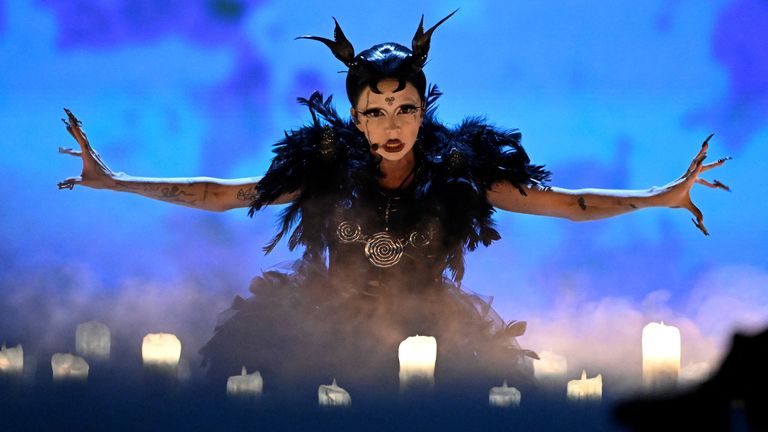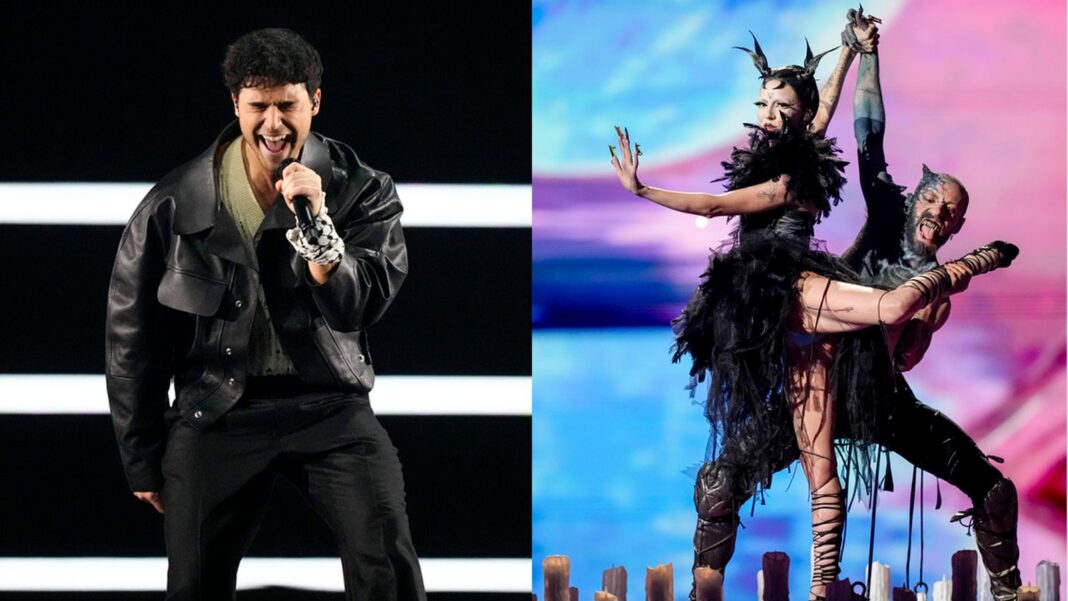The Eurovision Song Contest is already facing controversy over performers making political statements ahead of the big event in Sweden at the weekend.
Bambie Thug, who will represent Ireland, has criticised organisers for asking the performer to alter a pro-Palestinian message before their performance in the first semi-final last night.
Meanwhile, the European Broadcasting Union (EBU) has put out a statement expressing “regret” that former Swedish contestant Eric Saade, who is reportedly of Palestinian origin, was wearing a keffiyeh – a traditional scarf that has become a symbol of support – tied around his wrist as he sang.
He is not competing this year, but opened the first Eurovision semi-final show in his home country ahead of the finalists being chosen.
Eden Golan will compete for Israel. Pic: Sarah Louise Bennett/EBU
Eurovision bills itself as a non-political event and organisers have resisted calls to boycott Israel, sparking protests.
Israel’s Eden Golan will perform her song Hurricane in the second semi-final on Thursday, with bookmakers placing her among the top 10 most likely to win the competition.
Security is being ramped up in the Swedish host city of Malmo, which expects to welcome some 100,000 Eurovision fans – along with thousands of pro-Palestinian protesters, with demonstrations against the Israel-Hamas war planned on Thursday and Saturday.
After making it through to the final with their song Doomsday Blue, Ireland’s Bambie Thug told reporters at a news conference that they had been forced to change writing painted on their body ahead of the semi-final performance.
The 31-year-old singer said the painted script in Ogham – an early Medieval alphabet – had translated to ‘ceasefire and freedom’.

Bambie Thug says she was forced to change her body paint. Pic: Reuters
“It was very important for me because I’m pro justice and pro peace,” they said. “Unfortunately, I had to change those messages today to ‘crown the witch’ only (which was an) order from the EBU.”
A spokesperson for the EBU said: “The writing seen on Bambie Thug’s body during dress rehearsals contravened contest rules that are designed to protect the non-political nature of the event.
“After discussions with the Irish delegation, they agreed to change the text for the live show.”
In a separate statement about Saade’s opening performance, an EBU spokesperson said the organisation “regrets” that he chose to wear the keffiyeh pattern material and “chose to compromise the non-political nature of the event”.

The UK’s Olly Alexander will perform Dizzy in the final on Saturday. Pic: Reuters
Elsewhere, UK entrant Olly Alexander also performed at the event to showcase his song, Dizzy, although he is already through to the final as the UK is one of the “big five” Eurovision donors.
The Years & Years singer has found himself facing criticism from some who called for him to withdraw over Israel’s inclusion amid the ongoing war.
He addressed the controversy in a documentary following him as he prepares for the show, describing some comments he and other contestants have received as “very extreme”.
In April, Eurovision organisers condemned the abuse and harassment of contestants over Israel’s inclusion in the competition as “unacceptable and totally unfair”.
Read more on Eurovision:
Who will win and the acts to look out for
Everything you need to know about this year’s show

Keep up with all the latest news from the UK and around the world by following Sky News
Speaking on Sky’s Sunday Morning with Trevor Phillips, EBU deputy director general Jean Philip De Tender defended Israel’s inclusion.
“We do understand the concerns and deeply held views around the war in the Middle East,” he said.
“The song contest is a music event organised and co-produced by 37 public broadcasters, it’s not a competition between nations or governments.
“Our governing bodies reviewed the participation of Kan [Israel’s public broadcasting corporation] and found that they met all of the competing rules.”







